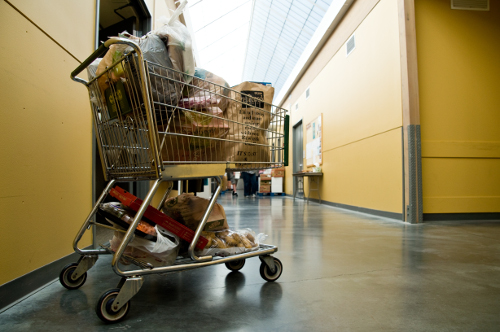With changes, college food pantry continues to assist those in need
By Jessica Skaggs
On average, 40 to 60 people a week visit the college’s food pantry seeking donated items. There, they find canned foods, microwavable meals, as well as hygiene items and baby products.
The food pantry was originally established in November of 2011 by a former club known as Students in Free Enterprise (SIFE), according to the college’s website. In an effort to raise awareness of hunger and encourage support for hunger relief in North America, Campbell’s Soup Company issued the challenge, “Let’s Can Hunger” to SIFE groups across the country. With the assistance of dean of business Lindy Robinson, the club became aware of the need within their area and created the college food pantry.
“The idea was to help students and faculty and community with access to a food pantry,” Robinson said.
Although SIFE is no longer around, hunger relief remained a concern of Robinson. She said political science professor and Model UN team advisor Brian Wright, immediately accepted the responsibility of maintaining and running the pantry.
“I think the students on campus are interested in helping other students on campus,” Wright said. “It’s a great opportunity for those in need.”
Prior to running the food pantry, the group had more of an off-campus presence, and had been seeking ways to get more involved in on-campus activities. The pantry offered to not only help their community and fellow students, but also increase their presence on campus.
“They do a great job for us,” Robinson said. “They manage to keep it organized and stocked. Sometimes Brian himself […] with the monetary donations, he goes to the grocery store and buys food and brings it in. But the students are doing a great job.”
The pantry, open from 8 a.m. to 5 p.m. on weekdays, is purposefully hidden away in the office space of OCB 272, as to ensure easy, self-serve access and privacy for anyone who is in need.
“We don’t ask for identification […] all we ask for is, how many people are you feeding so we have an idea of how many people, but we don’t ask for identification,” Robinson said. “We know some of the people that are using the pantry aren’t Johnson County students, but that’s irrelevant to us, we don’t really care; because they have a need. When we first started people would say well how are you going to monitor it? How are you going to know whether they’re students or not, I said I don’t really care. If they have a need, I don’t care who they are. It makes no difference to me.”
Model UN member, Elysia Chao, is planning on expanding the food pantry in both size and variety of resources.
“Right now it’s just, come in and grab whatever, oh we’re really low on that, we should buy more of that, and that’s it […] it’s not at its full potential,” Chao said. “I think it can be a lot bigger.”
However, community support is needed in order to make expansion possible.
“It’s Johnson County so there’s not many people who are dying of hunger,” Chao said. “There are people who can’t afford food all the time, especially students, and I’ve met people who have gone maybe like a day or two without food just because they couldn’t afford it.”
Items such as canned protein, canned fruits and microwavable meals, are all highly sought after. Monetary donations can be written out to Model UN as well.
“We do have a lot of regular customers,” Robinson said. “And I really believe we are providing a very valuable service to the campus and to the community.”
Contact Jessica Skaggs, managing editor, at [email protected].






















